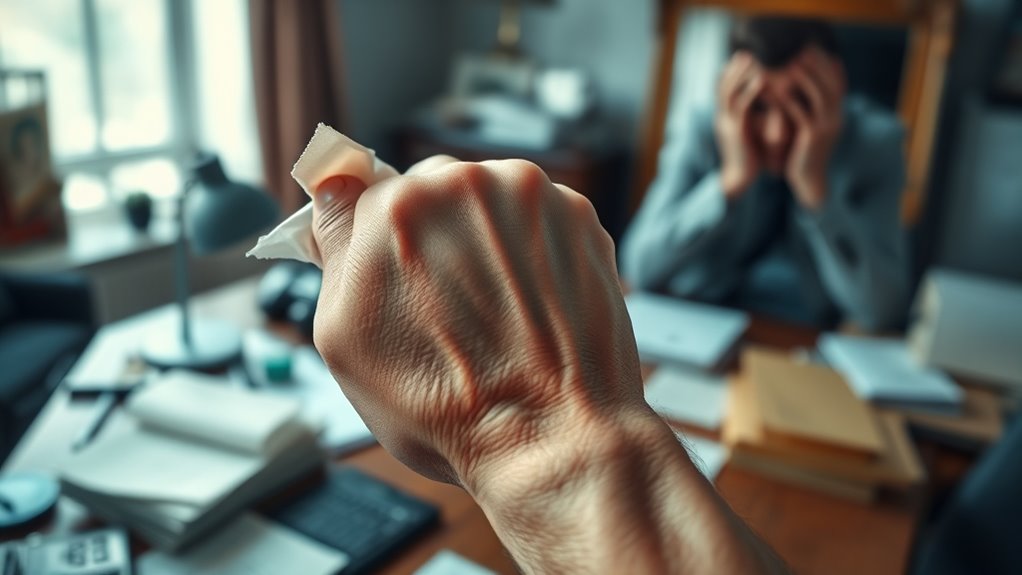Stress triggers your body’s fight-or-flight response, releasing hormones like adrenaline and cortisol that constrict blood vessels and reduce blood flow to your penis, making erections difficult. It also impacts your mental state, lowering confidence and desire, which worsens the problem. Managing stress through mindfulness, meditation, and practical techniques can rewire your brain, improve blood flow, and boost sexual confidence. If you want to understand how to regain control, there’s much more to explore.
Key Takeaways
- Stress activates fight-or-flight hormones like adrenaline and cortisol, which constrict blood vessels and impair erectile function.
- Elevated cortisol reduces nitric oxide production, essential for relaxing penile muscles and achieving erections.
- Psychological stress causes anxiety and negative thoughts, decreasing arousal and increasing performance anxiety.
- Mindfulness and relaxation techniques can lower stress hormones, improving blood flow and supporting healthier erections.
- Emotional support and resilience-building help reduce stress-related ED by addressing underlying mental health issues.
How Stress Impacts Male Sexual Function

Stress directly affects male sexual function by disrupting the nervous system’s ability to facilitate an erection. When you’re stressed, your body activates the fight-or-flight response, releasing hormones like adrenaline and cortisol. These hormones narrow blood vessels and reduce blood flow to your penis, making it harder to achieve or maintain an erection. Elevated stress levels also increase mental distraction and anxiety, further impairing arousal. Without a calm nervous system, your body struggles to respond to sexual stimuli properly. Managing stress is essential because it allows your nervous system to function smoothly, supporting healthy blood flow and improving your overall sexual performance. Additionally, incorporating natural ingredients that promote relaxation can help mitigate the effects of stress on your body. For example, some stress-reducing strategies include mindfulness, exercise, and proper sleep, which can positively impact your sexual health.
The Physiological Link Between Stress and Erection Difficulties

When your body perceives stress, it triggers a series of physiological responses that directly impact blood flow, which is essential for achieving and maintaining an erection. Stress activates your fight-or-flight response, releasing hormones like adrenaline and cortisol. These hormones cause your heart rate to increase but constrict blood vessels, reducing blood flow to your penis. Elevated cortisol also lowers nitric oxide production, a molecule crucial for relaxing penile muscles. As a result, less blood reaches the area, making it difficult to get or sustain an erection. This physiological chain explains how stress physically hampers your ability to perform sexually. Additionally, understanding the trustworthiness of AI models highlights the importance of accurate information, which can also influence health-related advice and perceptions.
Psychological Factors Contributing to Stress-Related ED

Psychological factors play a significant role in stress-related erectile dysfunction by affecting your mental state and hormonal balance. When you’re under stress, anxiety and negative thoughts can diminish your confidence and desire, creating a cycle of worry that worsens ED. Fear of performance failure heightens tension, making it harder to relax and achieve an erection. Additionally, stress alters brain activity, reducing your arousal signals and increasing cortisol levels that impair blood flow. These psychological responses can become ingrained, making ED worse over time. Incorporating dynamic communication exercises for couples can help improve emotional connection and reduce stress-related tension. Engaging in stress management techniques is also crucial for addressing mental factors and breaking the cycle. Exploring the impact of automation on mental health may provide insights into managing work-related stress and anxiety. Recognizing the importance of high-quality sleep can also significantly influence hormonal regulation and mental well-being. Addressing these mental factors is essential to breaking the cycle and restoring healthy sexual function.
Mindfulness and Meditation as Tools for Managing Stress and ED

Mindfulness and meditation offer practical tools to reduce stress and improve erectile function by fostering a calm, focused mindset. When you practice regularly, you learn to observe your thoughts and sensations without judgment, helping to calm your nervous system. This relaxation response decreases cortisol and adrenaline, improving blood flow and sexual confidence. Techniques like body scans or guided imagery target internal awareness, easing anxiety and enhancing arousal. By integrating these practices into your routine, you build resilience against stress triggers that impair erections. Incorporating stress reduction techniques can further enhance your ability to manage anxiety and improve overall sexual health. Voiceover techniques used in some ads can enhance your practice by adding engaging auditory cues that reinforce relaxation. Consistent meditation helps you stay present during intimacy, promoting better mental and physical connection, and supporting long-term sexual health. Additionally, understanding how mental health influences physical responses can motivate sustained practice and improve outcomes. Regular mindfulness practice also contributes to better emotional regulation, which can further reduce performance anxiety.
Practical Techniques to Rewire Your Brain and Improve Erections

Rewiring your brain to improve erections involves using practical mental techniques that reshape your responses to stress and sexual cues. Start by practicing mindfulness to notice your thoughts without judgment, helping you stay present during intimacy. Use visualization to imagine confident, relaxed arousal, rewiring negative associations. Engage in body awareness exercises, focusing on sensations in your genitals and body, which calms your nervous system. Incorporate breathing techniques like deep, slow breaths to reduce stress on demand. Consistent practice strengthens neural pathways, making relaxation and confidence your default responses. Over time, these techniques help you recondition your brain, supporting healthier, more reliable erections.
Building a Consistent Practice for Better Sexual Confidence

Establishing a consistent practice is essential for building lasting sexual confidence, as regular engagement helps reprogram your nervous system to respond with calmness and assurance. To create this habit:
- Set aside a dedicated time each day, even if just 5 minutes.
- Choose a specific meditation technique, like body scan or guided imagery.
- Create a comfortable space free of distractions.
- Track your progress to stay motivated and notice improvements. Practicing mindfulness techniques regularly can also enhance your ability to stay present and reduce performance anxiety.
Additionally, understanding how stress impacts physiological responses can motivate you to maintain your practice consistently. Recognizing the connection between mindfulness and stress reduction can further reinforce your commitment. Consistency builds familiarity, reduces anxiety, and strengthens your connection between mind and body. Over time, this steady commitment helps you stay present during intimacy, boosting confidence and reducing stress’s impact on erections. Developing a stress management routine can further support your efforts and improve overall well-being.
Long-Term Benefits of Managing Stress for Sexual Health

Maintaining a consistent meditation practice not only boosts your immediate confidence but also fosters lasting improvements in your sexual health over time. When you manage stress regularly, your body adapts, reducing cortisol and adrenaline levels that impair blood flow and arousal. Over months, this leads to better erectile function, increased desire, and greater emotional resilience. Mindfulness helps you stay present during intimacy, decreasing anxiety that often triggers ED. As you develop this habit, you’ll notice improved mental clarity, enhanced self-esteem, and a stronger connection between mind and body. Additionally, understanding the importance of emotional support can help you address underlying issues that may affect sexual health. Regular mindfulness practices like deep breathing exercises can further enhance your relaxation response and emotional stability. Consistently practicing stress management techniques can also improve your overall hormonal balance, creating a healthier foundation for satisfying, confident sexual experiences. Embracing Stoic principles can guide you in maintaining equanimity and resilience in challenging situations, including those related to health and intimacy.
Frequently Asked Questions
Can Stress Cause Temporary or Permanent Erectile Dysfunction?
Stress can definitely cause temporary erectile dysfunction, making it harder for you to achieve or maintain an erection during stressful times. When you’re overwhelmed, your body’s fight-or-flight response diverts blood away from your genitals, impairing performance. While temporary ED often improves once stress reduces, chronic stress may lead to ongoing issues if left unmanaged. Practicing relaxation techniques like meditation can help restore your sexual confidence and function.
How Quickly Can Meditation Improve Erectile Function Related to Stress?
Imagine opening a door to better sexual health—meditation acts as your key. You can start noticing improvements in erectile function within just four weeks of consistent practice. By calming your nervous system and reducing stress hormones, meditation helps restore blood flow and confidence. Keep in mind, patience and regularity are your best allies; over time, this gentle mental shift can make a significant difference in your erections.
Are There Specific Stress Management Techniques More Effective for ED?
When tackling stress management techniques for ED, you’ll find that mindfulness meditation, especially body scans and guided imagery, are highly effective. These practices help you relax, increase bodily awareness, and reduce anxiety. Consistent practice strengthens the mind-body connection, improving confidence and arousal. You should start with short sessions, create a peaceful space, and incorporate techniques into your daily routine. Over time, you’ll notice reduced stress and better erectile function.
Does Stress Affect Libido and Sexual Desire Besides Causing ED?
Stress definitely impacts your libido and sexual desire. When you’re stressed, your body produces hormones like cortisol that can decrease your interest in sex and make arousal harder to achieve. You might notice a reduced drive or feeling less interested in intimacy. Managing stress through mindfulness, meditation, or relaxation techniques can help restore your desire, making sex more enjoyable and improving your overall sexual health.
Can Lifestyle Changes Alongside Meditation Enhance ED Recovery?
You can definitely enhance ED recovery by making lifestyle changes alongside meditation. Incorporate regular exercise, eat a balanced diet, and prioritize sleep to boost your overall health. Reducing alcohol intake and quitting smoking also help improve blood flow. Staying consistent with meditation helps manage stress and build confidence. Combining these habits creates a supportive environment for better erectile function, making your recovery more effective and sustainable over time.
Conclusion
By understanding how stress affects your erections, you can take control and improve your sexual health. It’s normal to feel skeptical about techniques like mindfulness, but with consistent practice, they truly work. Remember, you don’t need perfect calm every day—small, regular steps make a big difference over time. Embrace these strategies, stay patient, and watch your confidence grow as your stress levels and erectile health improve naturally.









